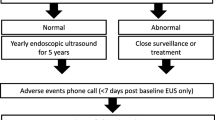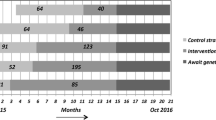Abstract
Pancreatic ductal adenocarcinoma (PDAC) is a leading cause of cancer death; approximately 5–10% of PDAC is hereditary. Self-administered health history questionnaires (HHQs) may provide a low-cost method to detail family history (FH) of malignancy. Pancreas Center patients were asked to enroll in a registry; 149 with PDAC completed a HHQ which included FH data. Patients with FH of PDAC, or concern for inherited PDAC syndrome, were separately evaluated in a Prevention Program and additionally met with a genetic counselor (GC) to assess PDAC risk (n = 61). FH obtained through GC and HHQ were compared using Wilcoxon signed-rank sum and generalized linear mixed models with Poisson distribution. Agreement between GC and HHQ risk-assessment was assessed using kappa (κ) statistic. In the Prevention Program, HHQ was as precise in detecting FH of cancer as the GC (all p > 0.05). GC and HHQ demonstrated substantial agreement in risk-stratification of the Prevention Program cohort (κ = 0.73, 95% CI 0.59–0.87.) The sensitivity of the HHQ to detect a patient at elevated risk (i.e., moderate- or high-risk) of PDAC, compared to GC, was 82.9% (95% CI 67.3–92.3%) with a specificity of 95% (95% CI 73.1–99.7%). However, seven patients who were classified as average-risk by the HHQ were found to be at an elevated-risk of PDAC by the GC. In the PDAC cohort, 30/149 (20.1%) reported at least one first-degree relative (FDR) with PDAC. The limited sensitivity of the HHQ to detect patients at elevated risk of PDAC in the Prevention Program cohort suggests that a GC adds value in risk-assessment in this population. The HHQ may offer an opportunity to identify high-risk patients in a PDAC population.
Similar content being viewed by others
References
American Cancer Society. (2016). Cancer Facts & Figures 2016. Atlanta: American Cancer Society.
Applebaum-Shapiro, S. E., Finch, R., Pfutzer, R. H., Hepp, L. A., Gates, L., Amann, S., & Whitcomb, D. C. (2001). Hereditary pancreatitis in North America: the Pittsburgh-Midwest Multi-Center Pancreatic Study Group Study. Pancreatology, 1(5), 439–443.
Arslan, A. A., Helzlsouer, K. J., Kooperberg, C., Shu, X. O., Steplowski, E., Bueno-de-Mesquita, H. B., & Pancreatic Cancer Cohort, C. (2010). Anthropometric measures, body mass index, and pancreatic cancer: a pooled analysis from the Pancreatic Cancer Cohort Consortium (PanScan). Archives of Internal Medicine, 170(9), 791–802. doi:10.1001/archinternmed.2010.63.
Axilbund, J. E., & Wiley, E. A. (2012). Genetic testing by cancer site: pancreas. Cancer Journal, 18(4), 350–354. doi:10.1097/PPO.0b013e3182624694.
Becker, A. E., Hernandez, Y. G., Frucht, H., & Lucas, A. L. (2014). Pancreatic ductal adenocarcinoma: risk factors, screening, and early detection. World Journal of Gastroenterology, 20(32), 11182–11198. doi:10.3748/wjg.v20.i32.11182.
Ben, Q., Xu, M., Ning, X., Liu, J., Hong, S., Huang, W., & Li, Z. (2011). Diabetes mellitus and risk of pancreatic cancer: a meta-analysis of cohort studies. European Journal of Cancer, 47(13), 1928–1937. doi:10.1016/j.ejca.2011.03.003.
Brentnall, T. A., Bronner, M. P., Byrd, D. R., Haggitt, R. C., & Kimmey, M. B. (1999). Early diagnosis and treatment of pancreatic dysplasia in patients with a family history of pancreatic cancer. Annals of Internal Medicine, 131(4), 247–255.
Brown, H., & Prescott, R. (2015). Applied mixed models in medicine (Third edition. ed.). Chichester, West Sussex; Hoboken: John Wiley & Sons Inc.
Buchanan, A. H., Datta, S. K., Skinner, C. S., Hollowell, G. P., Beresford, H. F., Freeland, T., & Adams, M. B. (2015). Randomized trial of telegenetics vs. in-person cancer genetic counseling: cost, patient satisfaction and attendance. Journal of Genetic Counseling, 24(6), 961–970. doi:10.1007/s10897-015-9836-6.
Canto, M. I., Harinck, F., Hruban, R. H., Offerhaus, G. J., Poley, J. W., Kamel, I., & Bruno, M. (2012a). International cancer of the pancreas screening (CAPS) Consortium summit on the management of patients with increased risk for familial pancreatic cancer. Gut. doi:10.1136/gutjnl-2012-303108.
Canto, M. I., Hruban, R. H., Fishman, E. K., Kamel, I. R., Schulick, R., Zhang, Z., & Goggins, M. (2012b). Frequent detection of pancreatic lesions in asymptomatic high-risk individuals. Gastroenterology, 142(4), 796–804. doi:10.1053/j.gastro.2012.01.005. quiz e714-795.
Couch, F. J., Johnson, M. R., Rabe, K. G., Brune, K., de Andrade, M., Goggins, M., & Hruban, R. H. (2007). The prevalence of BRCA2 mutations in familial pancreatic cancer. Cancer Epidemiology, Biomarkers and Prevention, 16(2), 342–346. doi:10.1158/1055-9965.EPI-06-0783.
Egawa, S., Takeda, K., Fukuyama, S., Motoi, F., Sunamura, M., & Matsuno, S. (2004). Clinicopathological aspects of small pancreatic cancer. Pancreas, 28(3), 235–240.
Genkinger, J. M., Spiegelman, D., Anderson, K. E., Bergkvist, L., Bernstein, L., van den Brandt, P. A., & Smith-Warner, S. A. (2009). Alcohol intake and pancreatic cancer risk: a pooled analysis of fourteen cohort studies. Cancer Epidemiology, Biomarkers and Prevention, 18(3), 765–776. doi:10.1158/1055-9965.EPI-08-0880.
Giardiello, F., Brensinger, J., Tersmette, A., Goodman, S., Petersen, G., Booker, S., & Offerhaus, J. (2000). Very high risk of cancer in familial Peutz-Jeghers syndrome. Gastroenterology, 119(6), 1447–1453.
Goldstein, A. M. (2004). Familial melanoma, pancreatic cancer and germline CDKN2A mutations. Human Mutation, 23(6), 630. doi:10.1002/humu.9247.
Hahn, S. A., Greenhalf, B., Ellis, I., Sina-Frey, M., Rieder, H., Gerdes, B., & Bartsch, D. (2003). BRCA2 germline mutations in familial pancreatic carcinoma. Gastroenterology, 124(4), A548–A548.
Howes, N., Lerch, M. M., Greenhalf, W., Stocken, D. D., Ellis, I., Simon, P., & Pancreatic, C. (2004). Clinical and genetic characteristics of hereditary pancreatitis in Europe. Clinical Gastroenterology and Hepatology, 2(3), 252–261.
Iodice, S., Gandini, S., Maisonneuve, P., & Lowenfels, A. B. (2008). Tobacco and the risk of pancreatic cancer: a review and meta-analysis. Langenbeck’s Archives of Surgery, 393(4), 535–545. doi:10.1007/s00423-007-0266-2.
Ishikawa, O., Ohigashi, H., Imaoka, S., Nakaizumi, A., Uehara, H., Kitamura, T., & Kuroda, C. (1999). Minute carcinoma of the pancreas measuring 1 cm or less in diameter--collective review of Japanese case reports. Hepato-Gastroenterology, 46(25), 8–15.
Kastrinos, F., Mukherjee, B., Tayob, N., Wang, F., Sparr, J., Raymond, V. M., & Syngal, S. (2009). Risk of pancreatic cancer in families with Lynch syndrome. JAMA, 302(16), 1790–1795. doi:10.1001/jama.2009.1529.
Klein, A. P., Hruban, R. H., Brune, K. A., Petersen, G. M., & Goggins, M. (2001). Familial pancreatic cancer. Cancer Journal, 7(4), 266–273.
Klein, A. P., Brune, K. A., Petersen, G. M., Goggins, M., Tersmette, A. C., Offerhaus, G. J., & Hruban, R. H. (2004). Prospective risk of pancreatic cancer in familial pancreatic cancer kindreds. Cancer Research, 64(7), 2634–2638.
Klein, A. P., Lindstrom, S., Mendelsohn, J. B., Steplowski, E., Arslan, A. A., Bueno-de-Mesquita, H. B., & Kraft, P. (2013). An absolute risk model to identify individuals at elevated risk for pancreatic cancer in the general population. PLoS One, 8(9), e72311. doi:10.1371/journal.pone.0072311.
Landis, J. R., & Koch, G. G. (1977). The measurement of observer agreement for categorical data. Biometrics, 33(1), 159–174.
Lucas, A. L., Shakya, R., Lipsyc, M. D., Mitchel, E. B., Kumar, S., Hwang, C., & Frucht, H. (2013). High prevalence of BRCA1 and BRCA2 germline mutations with loss of heterozygosity in a series of resected pancreatic adenocarcinoma and other neoplastic lesions. Clinical Cancer Research, 19(13), 3396–3403. doi:10.1158/1078-0432.CCR-12-3020.
Lucas, A. L., Frado, L. E., Hwang, C., Kumar, S., Khanna, L. G., Levinson, E. J., & Frucht, H. (2014). BRCA1 and BRCA2 germline mutations are frequently demonstrated in both high-risk pancreatic cancer screening and pancreatic cancer cohorts. Cancer, 120(13), 1960–1967. doi:10.1002/cncr.28662.
Lucenteforte, E., La Vecchia, C., Silverman, D., Petersen, G. M., Bracci, P. M., Ji, B. T., & Duell, E. J. (2012). Alcohol consumption and pancreatic cancer: a pooled analysis in the International Pancreatic Cancer Case–control Consortium (PanC4). Annals of Oncology, 23(2), 374–382. doi:10.1093/annonc/mdr120.
Lynch, H. T., Fusaro, R. M., Lynch, J. F., & Brand, R. (2008). Pancreatic cancer and the FAMMM syndrome. Familial Cancer, 7(1), 103–112. doi:10.1007/s10689-007-9166-4.
Michaud, D. S., Vrieling, A., Jiao, L., Mendelsohn, J. B., Steplowski, E., Lynch, S. M., & Stolzenberg-Solomon, R. Z. (2010). Alcohol intake and pancreatic cancer: a pooled analysis from the pancreatic cancer cohort consortium (PanScan). Cancer Causes and Control, 21(8), 1213–1225. doi:10.1007/s10552-010-9548-z.
Murphy, K. M., Brune, K. A., Griffin, C., Sollenberger, J. E., Petersen, G. M., Bansal, R., & Kern, S. E. (2002). Evaluation of candidate genes MAP2K4, MADH4, ACVR1B, and BRCA2 in familial pancreatic cancer: deleterious BRCA2 mutations in 17%. Cancer Research, 62(13), 3789–3793.
Pandharipande, P. V., Heberle, C., Dowling, E. C., Kong, C. Y., Tramontano, A., Perzan, K. E., & Hur, C. (2015). Targeted screening of individuals at high risk for pancreatic cancer: results of a simulation model. Radiology, 275(1), 177–187. doi:10.1148/radiol.14141282.
SAS Institute Inc. (2011). SAS® 9.3 System Options: Reference (2nd ed.). Cary, NC: SAS Institute Inc.
Shi, C., Hruban, R. H., & Klein, A. P. (2009). Familial pancreatic cancer. Archives of Pathology and Laboratory Medicine, 133(3), 365–374.
Siegel, R., Ma, J., Zou, Z., & Jemal, A. (2014). Cancer statistics, 2014. CA: A Cancer Journal for Clinicians, 64(1), 9–29. doi:10.3322/caac.21208.
Spanknebel, K., & Conlon, K. C. (2001). Advances in the surgical management of pancreatic cancer. Cancer Journal, 7(4), 312–323.
Thompson, D., & Easton, D. F. (2002). Cancer Incidence in BRCA1 mutation carriers. Journal of the National Cancer Institute, 94(18), 1358–1365.
Trepanier, A. M., & Allain, D. C. (2014). Models of service delivery for cancer genetic risk assessment and counseling. Journal of Genetic Counseling, 23(2), 239–253. doi:10.1007/s10897-013-9655-6.
U.S. Department of Health and Human Services. (2014). The Health Consequences of Smoking: 50 Years of Progress. A Report of the Surgeon General. Atlanta, G. U. S. D.
Umar, A., Boland, C. R., Terdiman, J. P., Syngal, S., de la Chapelle, A., Ruschoff, J., & Srivastava, S. (2004). Revised Bethesda guidelines for hereditary nonpolyposis colorectal cancer (Lynch syndrome) and microsatellite instability. Journal of the National Cancer Institute, 96(4), 261–268.
Vasen, H., Ibrahim, I., Ponce, C. G., Slater, E. P., Matthai, E., Carrato, A., & Bartsch, D. K. (2016). Benefit of surveillance for pancreatic cancer in high-risk individuals: outcome of long-term prospective follow-up studies from three European expert centers. Journal of Clinical Oncology, 34(17), 2010–2019. doi:10.1200/JCO.2015.64.0730.
Verna, E. C., Hwang, C., Stevens, P. D., Rotterdam, H., Stavropoulos, S. N., Sy, C. D., & Frucht, H. (2010). Pancreatic cancer screening in a prospective cohort of high-risk patients: a comprehensive strategy of imaging and genetics. Clinical Cancer Research, 16(20), 5028–5037. doi:10.1158/1078-0432.CCR-09-3209.
Vinarsky, V., Fine, R. L., Assaad, A., Qian, Y., Chabot, J. A., Su, G. H., & Frucht, H. (2009). Head and neck squamous cell carcinoma in FAMMM syndrome. Head & Neck, 31(11), 1524–1527. doi:10.1002/hed.21050.
Author information
Authors and Affiliations
Corresponding author
Ethics declarations
Funding
Statement of Support: Dr. Lucas received support from the National Center for Advancing Translational Sciences, National Institutes of Health, through Grant Number UL1 TR000040 and UL1 TR000067.
Conflict of Interest
Aimee L. Lucas, Adam Tarlecki, Kellie Van Beck, Casey Lipton, Arindam RoyChoudhury, Elana Levinson, Sheila Kumar, Wendy K. Chung, Harold Frucht and Jeanine M. Genkinger declare that they have no conflict of interest.
Human Studies and Informed Consent
All procedures followed were in accordance with the ethical standards of the responsible committee on human experimentation (institutional and national) and with the Helsinki Declaration of 1975, as revised in 2000. The study was approved by the Institutional Review Board of Columbia University.
Animal Studies
No animal studies were carried out by the authors for this article.
Additional information
The content is solely the responsibility of the authors and does not necessarily represent the official views of the NIH.
Electronic supplementary material
Below is the link to the electronic supplementary material.
Supplemental Table 1
(DOCX 14 kb)
Rights and permissions
About this article
Cite this article
Lucas, A.L., Tarlecki, A., Van Beck, K. et al. Self-Reported Questionnaire Detects Family History of Cancer in a Pancreatic Cancer Screening Program. J Genet Counsel 26, 806–813 (2017). https://doi.org/10.1007/s10897-016-0057-4
Received:
Accepted:
Published:
Issue Date:
DOI: https://doi.org/10.1007/s10897-016-0057-4




